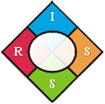List of Candidates for International Rough Set Society (IRSS) 2022 Election
This is an announcement of the list of candidates for IRSS 2022 Election.
Vice-president: Chris Cornelis, Hung Son Nguyen
Secretary: Hong Yu
Advisory Committee (AB) Chair: Davide Ciucci
Steering Committee (SC) Chair: Tianrui Li
PhD School Chair: Piotr Artiemjew, Xiaodong Yue
Schedule of Election:
December 15, 2022 - Deadline for receiving nominations
December 30, 2022 - Deadline for receiving vision statement
January 16 - February 5 (UTC/GMT +1), Voting
If you have any questions, please kindly contact Dr. Duoqian Miao at dqmiao@tongji.edu.cn
or Dr. JingTao Yao at Jingtao.Yao@uregina.ca
List of vision statements (click on a name to go to the statement or download PDF file):
Short biography:
Chris Cornelis obtained his PhD in Computer Science in 2004 from Ghent University, Belgium. Currently, he is a professor at the Department of Applied Mathematics, Computer Science and Statistics at Ghent University, as well as a beneficiary of the Odysseus program funded by the National Science Foundation-Flanders. In the past (2011-2016), he also worked at the Department of Computer Science and Artificial Intelligence at the University of Granada, Spain.
Since 2015, he is an IRSS Fellow. He served as the IRSS editor between 2012-2016 and took an active part in the organization of several IJCRS conferences, most notably as program chair for RSCTC 2014 and program co-chair for IJCRS 2021. Also, he gave a keynote talk at IJCRS 2019. His research interests focus mainly on fuzzy-rough hybridization and its application to machine learning. In this field, he has made numerous scientific contributions and has guided several PhD students. Finally, he is also an associate editor for the journals IEEE Transactions of Fuzzy Systems, International Journal of Approximate Reasoning and Information Sciences.
Vision Statement
Since its inception over 40 years ago, rough set theory has had a tremendous impact on researchers and practitioners alike, and has found its way into numerous theoretical and application-oriented domains. During my tenure as IRSS vice president, I plan to promote the further advancement of the rough set paradigm. This includes stimulating connections with other scientific fields where rough sets can make a difference, such as machine learning, decision making, operational research, mathematical logic and fuzzy set theory. Also, after the global pandemic, we should revive and continue the tradition of IJCRS conferences as a venue for bringing together the rough set communities from different continents, allowing them to exchange novel ideas and forge fruitful partnerships and collaborations. Summing up, abiding by the IRSS Bylaws, I will give it my best shot to ensure the continued success of Prof. Pawlak’s legacy.
Short biography:
mathematician, PhD in mathematical sciences. He specializes in mathematical logic, data mining, artificial intelligence, machine learning and the application of mathematics in computer science. Associate professor at the Institute of Computer Science, Faculty of Mathematics, Computer Science and Mechanics, University of Warsaw.He obtained his doctoral degree in 1997 on the basis of a thesis entitled Discretization of Real Value Attributes: Boolean Reasoning Approach, prepared under the supervision of prof. Andrzej Skowron. He habilitated in 2008 based on the evaluation of his scientific achievements and the dissertation entitled Boolean Inference Approximation: Fundamentals and Applications in Data Mining.He has published his work in journals such as "Transactions on Rough Sets", "International Journal of Hybrid Intelligent Systems" and "Fundamenta Informaticae".
Vision Statement
- IRSS should be an international organization supporting all scientists in the world in their research, application and development of new techniques in Rough sets. IRSS should support new collaboration initiatives like summer schools, training camps for young scientists and strengthening the ranking of conferences and journals for rough sets.
- Rough sets are not only a competitive approach to data analysis, but can also be complementary to other approaches.
- Rough Sets should follow the most recent trend in AI including eXplainable Artificial Intelligence (XAI) or robustness of (deep) learning algorithms.
